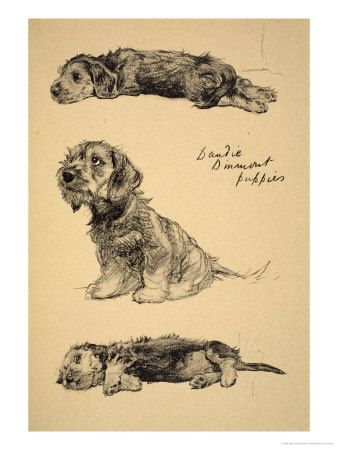
A lovely accounting of what a dog can mean to a person came from Steven Isserlis, the celebrated concert cellist who two years ago posted the following preface on his Facebook page:
“I cannot resist boasting that I received an email this morning – to my amazed delight – from someone who runs the Dandie Dinmont Terrier Club website congratulating me on what SHOULD (had the Great Lamppost in the Sky not untimely called him from us) have been the 50th birthday of my dog Dandy, a distinguished, brilliant and soulful Dandie Dinmont Terrier who entered my life when I was 6 years old, and thereafter had a huge effect on every aspect of it. (They say that dogs come to resemble their owners, but in this case I think that perhaps the opposite was the case: I endeavoured to be like Dandy in every way possible – bar the long floppy ears and the wagging tail.) It is extremely apt that Dandy should have shared a birthday with Mozart – since a) both were endowed with unique genius (Dandy had several PhDs – in barking, bone-burying, English Literature, etc) and b) Mozart was Dandy’s favourite composer. Every time my sisters used to play Mozart’s famous C-major piano sonata for him, Dandy would prop himself up on the arm of his special chair and howl with heart-rending sincerity and intensity. However, if they tried to trick him by changing key midway, he would abruptly stop in mid-howl, give them a filthy look, and get down off his chair in disgust. Dandy was a musical purist, in fact. Fair enough – it went with his general sense of integrity and purity; his was a thoroughly noble character.”
Isserlis remembers:
“When I was about six years old, my parents arrived home with a mysterious package that wriggled and made unaccountable noises and snuffled and was warm and (very shortly thereafter) unconditionally friendly.
“The package was a Dandie Dinmont Terrier whom we named (imaginatively) Dandy. Dandy was possessed of a long, tubular body, enormous brown eyes, long floppy ears and four short, stubby legs that only barely managed to transport the construction above them. In time, Dandy became a friend, confidant and personal assistant – the delight of my childhood, the toy of my dreams come to life.
“I soon realised that Dandy was capable of feeling, and expressing, every emotion known to man. Embarrassment, for instance – that most prevalent of states, at least for us British: once I was taking Dandy for a walk (or rather, he was taking me). Suddenly, dramatically, he espied a cat at the other end of the street. Off he set at a furious pace, dragging me along at the other end of his lead; no way was he going to put up with a feline being anywhere in is line of vision. As we drew dangerously close, however, he realised that it wasn’t a cat at all, but a very small dog. Dandy slowed down immediately, wagged his tail airily, looked upwards as if to remark on how much weather we’d been having recently, and nonchalantly sprinkled a nearby lamppost. It was the nearest thing to a canine blush that I have ever seen.
“In later years – after the sad departure (at a distinguished age, at least) of Dandy for the great lamppost in the sky – my deep affection for him spilled over into a general pleasure in dogs as a species. Of course, I am aware that dogs are not all loveable; one reads all too often of dogs bred to violence, or suddenly succumbing to vicious madness. But I am talking about your average domesticated dog – one who might bark at a stranger for a respectable amount of time, for the sake of appearances; but will then, duty done, settle down for a friendly chat about the world in general, preferably accompanied by a good pat or – better still – a gentle rub of the stomach. I love to see dogs walking along the street: how do they manage to convey such pleasure through the sheer shininess of their noses? Who gave them such wide-stretching mouths, which put our human smiles to shame? How do they manage to display such a huge range of feelings through the wagging of their tails? And what in life could be more delightful than a dog who, in order to ask a question, will put his or her head to one side; or, to make a conversational point, will stretch out a paw and lay it firmly on one’s leg or in one’s hand? Creation has come up with nothing more winning.”
Creation could have stopped there, though we conclude with the observation made by a great French dog lover who declared that the greatest defect of the canine species was that they ‘lived not long enough.’ Indeed.
Dandie Dinmont puppies by Cecil Aldin (1870-1935)
